Evaluating UK Government's Free School Meals Policy During COVID-19
VerifiedAdded on 2022/12/26
|9
|2537
|81
Essay
AI Summary
This essay provides an in-depth analysis of the UK government's free school meals policy implemented during the COVID-19 outbreak. It examines the policy's guidelines, including provisions for on-site meals, lunch parcels, and voucher schemes, while critically evaluating its impact on poverty and food security. The essay explores various economic theories related to poverty, such as the opportunity, behavioral, structural, and political theories, to understand the underlying causes of poverty and assess the effectiveness of the government's initiatives. It discusses the benefits of the policy, such as supporting families during economic hardship, and addresses criticisms, including concerns about food quality and the limitations of the support provided. The essay also highlights the role of key figures like Marcus Rashford in advocating for extended support and the challenges faced in implementing the policy effectively. Overall, the essay offers a comprehensive evaluation of the free school meals policy as a measure to combat poverty and hunger during the pandemic.
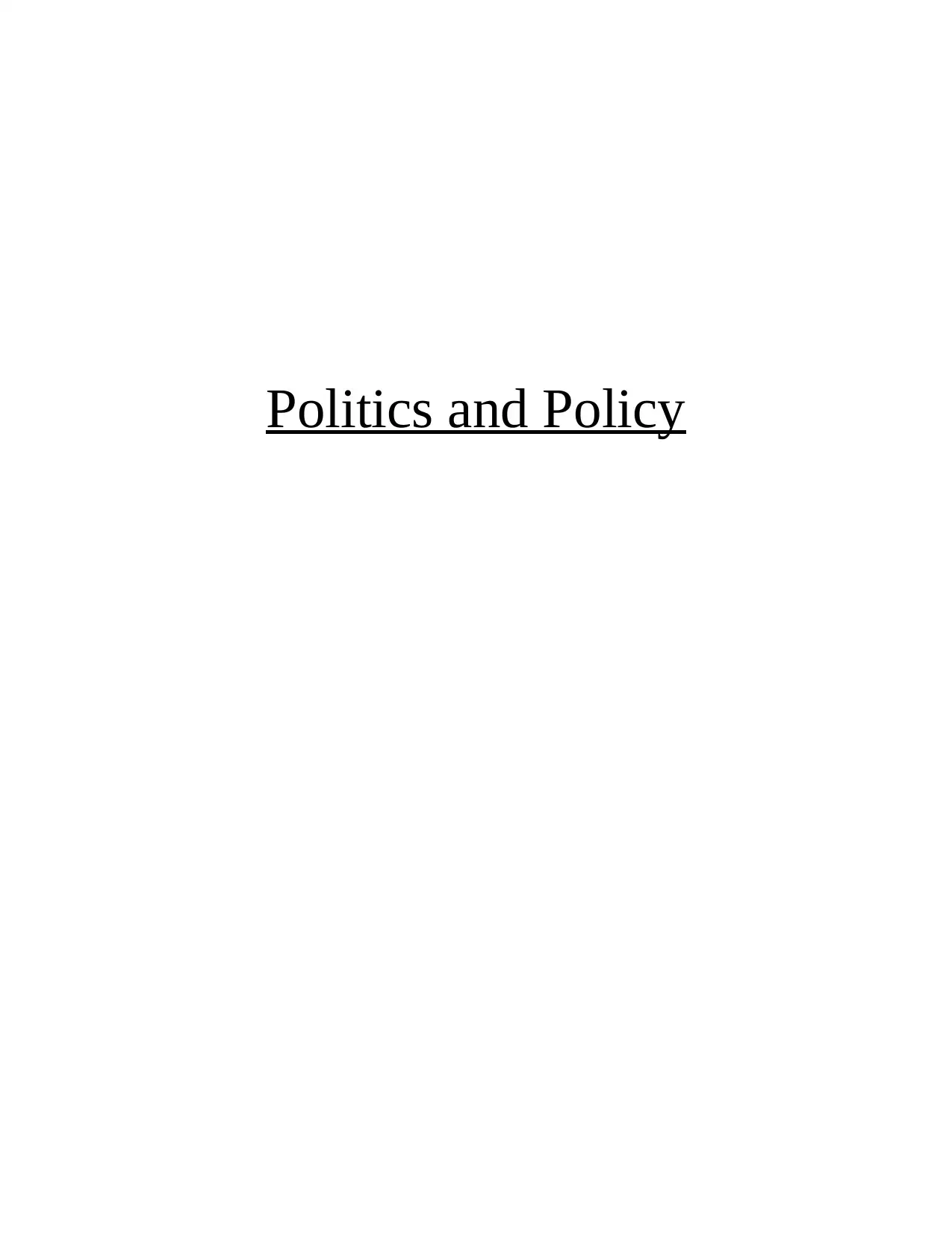
Politics and Policy
Paraphrase This Document
Need a fresh take? Get an instant paraphrase of this document with our AI Paraphraser
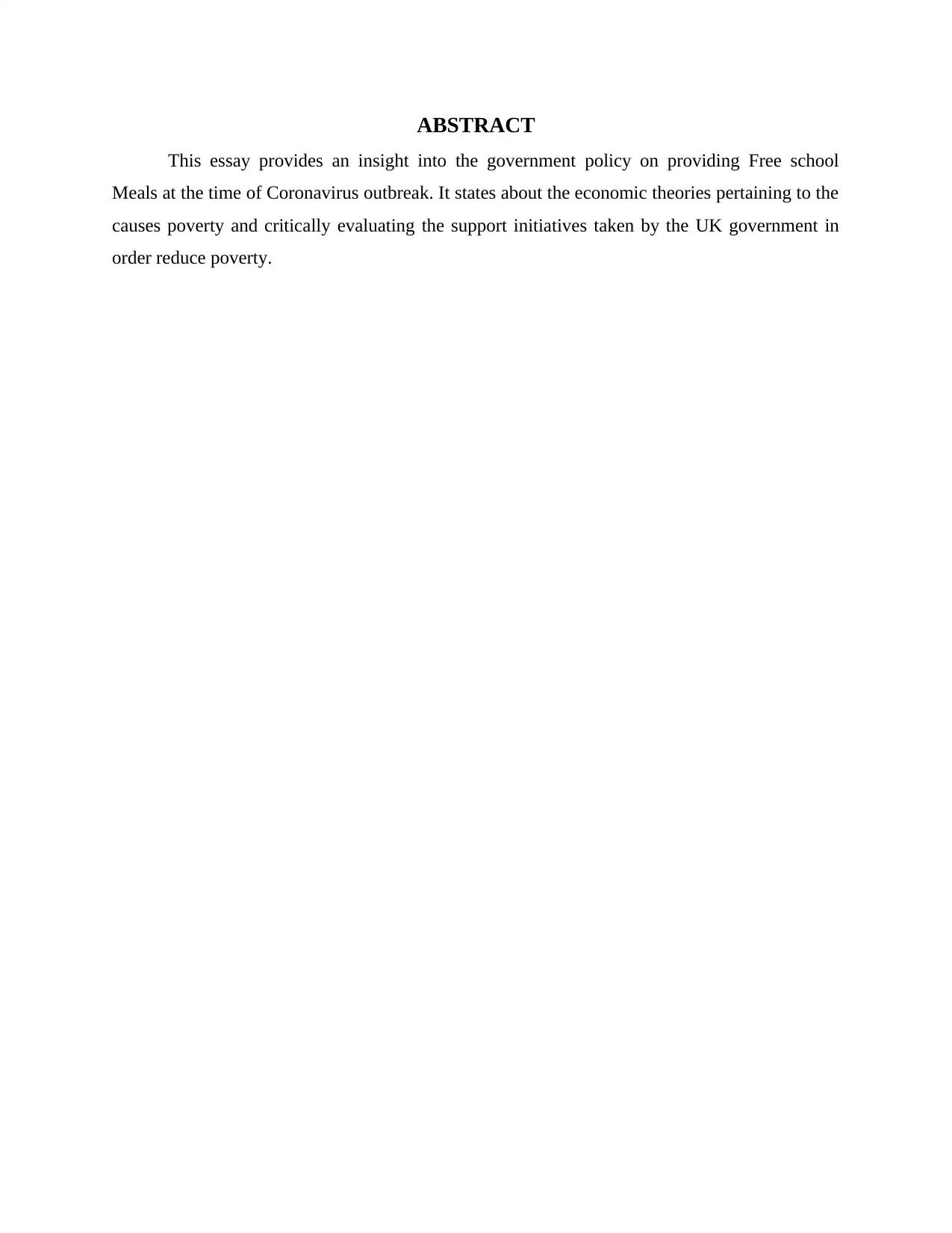
ABSTRACT
This essay provides an insight into the government policy on providing Free school
Meals at the time of Coronavirus outbreak. It states about the economic theories pertaining to the
causes poverty and critically evaluating the support initiatives taken by the UK government in
order reduce poverty.
This essay provides an insight into the government policy on providing Free school
Meals at the time of Coronavirus outbreak. It states about the economic theories pertaining to the
causes poverty and critically evaluating the support initiatives taken by the UK government in
order reduce poverty.
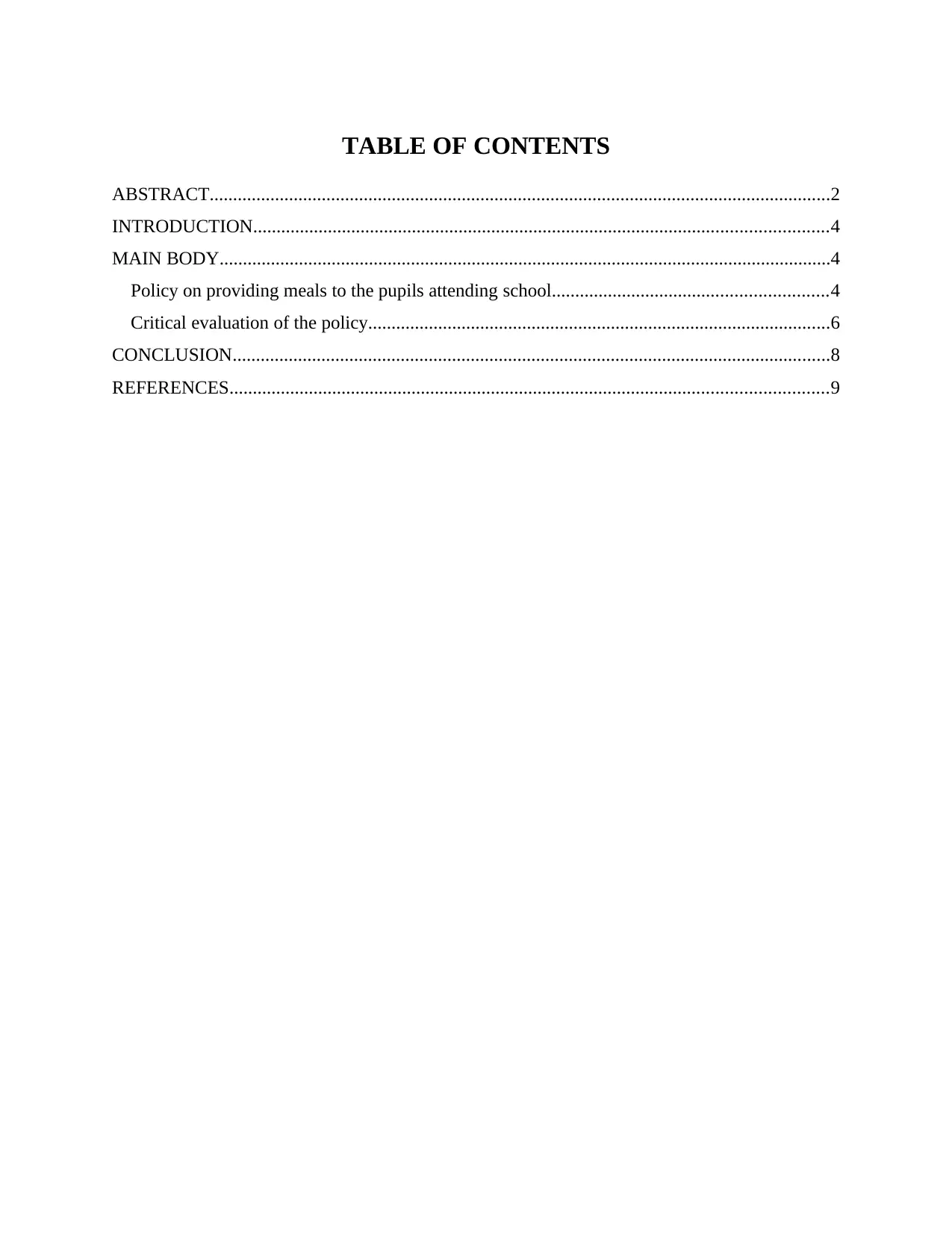
TABLE OF CONTENTS
ABSTRACT.....................................................................................................................................2
INTRODUCTION...........................................................................................................................4
MAIN BODY...................................................................................................................................4
Policy on providing meals to the pupils attending school...........................................................4
Critical evaluation of the policy...................................................................................................6
CONCLUSION................................................................................................................................8
REFERENCES................................................................................................................................9
ABSTRACT.....................................................................................................................................2
INTRODUCTION...........................................................................................................................4
MAIN BODY...................................................................................................................................4
Policy on providing meals to the pupils attending school...........................................................4
Critical evaluation of the policy...................................................................................................6
CONCLUSION................................................................................................................................8
REFERENCES................................................................................................................................9
⊘ This is a preview!⊘
Do you want full access?
Subscribe today to unlock all pages.

Trusted by 1+ million students worldwide
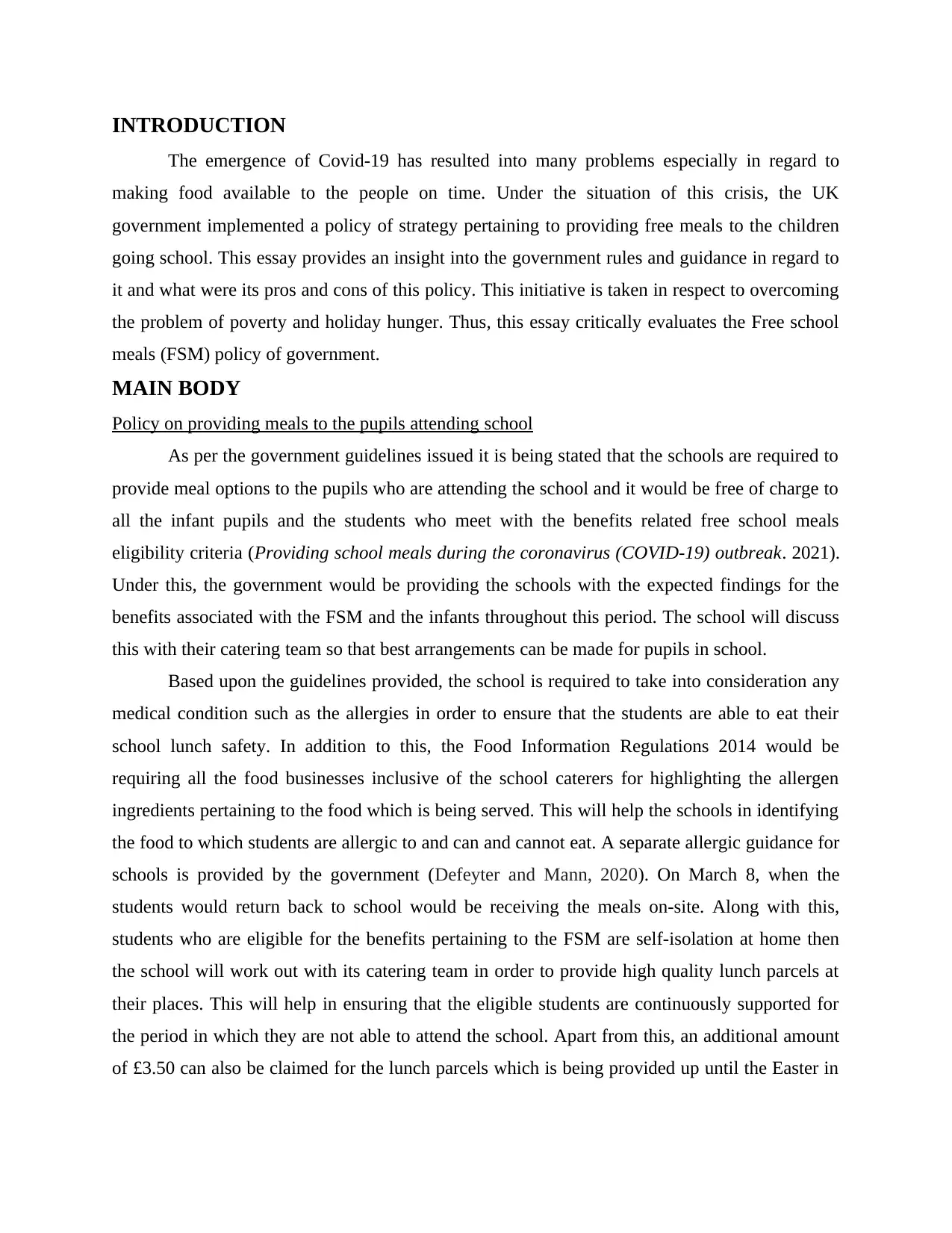
INTRODUCTION
The emergence of Covid-19 has resulted into many problems especially in regard to
making food available to the people on time. Under the situation of this crisis, the UK
government implemented a policy of strategy pertaining to providing free meals to the children
going school. This essay provides an insight into the government rules and guidance in regard to
it and what were its pros and cons of this policy. This initiative is taken in respect to overcoming
the problem of poverty and holiday hunger. Thus, this essay critically evaluates the Free school
meals (FSM) policy of government.
MAIN BODY
Policy on providing meals to the pupils attending school
As per the government guidelines issued it is being stated that the schools are required to
provide meal options to the pupils who are attending the school and it would be free of charge to
all the infant pupils and the students who meet with the benefits related free school meals
eligibility criteria (Providing school meals during the coronavirus (COVID-19) outbreak. 2021).
Under this, the government would be providing the schools with the expected findings for the
benefits associated with the FSM and the infants throughout this period. The school will discuss
this with their catering team so that best arrangements can be made for pupils in school.
Based upon the guidelines provided, the school is required to take into consideration any
medical condition such as the allergies in order to ensure that the students are able to eat their
school lunch safety. In addition to this, the Food Information Regulations 2014 would be
requiring all the food businesses inclusive of the school caterers for highlighting the allergen
ingredients pertaining to the food which is being served. This will help the schools in identifying
the food to which students are allergic to and can and cannot eat. A separate allergic guidance for
schools is provided by the government (Defeyter and Mann, 2020). On March 8, when the
students would return back to school would be receiving the meals on-site. Along with this,
students who are eligible for the benefits pertaining to the FSM are self-isolation at home then
the school will work out with its catering team in order to provide high quality lunch parcels at
their places. This will help in ensuring that the eligible students are continuously supported for
the period in which they are not able to attend the school. Apart from this, an additional amount
of £3.50 can also be claimed for the lunch parcels which is being provided up until the Easter in
The emergence of Covid-19 has resulted into many problems especially in regard to
making food available to the people on time. Under the situation of this crisis, the UK
government implemented a policy of strategy pertaining to providing free meals to the children
going school. This essay provides an insight into the government rules and guidance in regard to
it and what were its pros and cons of this policy. This initiative is taken in respect to overcoming
the problem of poverty and holiday hunger. Thus, this essay critically evaluates the Free school
meals (FSM) policy of government.
MAIN BODY
Policy on providing meals to the pupils attending school
As per the government guidelines issued it is being stated that the schools are required to
provide meal options to the pupils who are attending the school and it would be free of charge to
all the infant pupils and the students who meet with the benefits related free school meals
eligibility criteria (Providing school meals during the coronavirus (COVID-19) outbreak. 2021).
Under this, the government would be providing the schools with the expected findings for the
benefits associated with the FSM and the infants throughout this period. The school will discuss
this with their catering team so that best arrangements can be made for pupils in school.
Based upon the guidelines provided, the school is required to take into consideration any
medical condition such as the allergies in order to ensure that the students are able to eat their
school lunch safety. In addition to this, the Food Information Regulations 2014 would be
requiring all the food businesses inclusive of the school caterers for highlighting the allergen
ingredients pertaining to the food which is being served. This will help the schools in identifying
the food to which students are allergic to and can and cannot eat. A separate allergic guidance for
schools is provided by the government (Defeyter and Mann, 2020). On March 8, when the
students would return back to school would be receiving the meals on-site. Along with this,
students who are eligible for the benefits pertaining to the FSM are self-isolation at home then
the school will work out with its catering team in order to provide high quality lunch parcels at
their places. This will help in ensuring that the eligible students are continuously supported for
the period in which they are not able to attend the school. Apart from this, an additional amount
of £3.50 can also be claimed for the lunch parcels which is being provided up until the Easter in
Paraphrase This Document
Need a fresh take? Get an instant paraphrase of this document with our AI Paraphraser
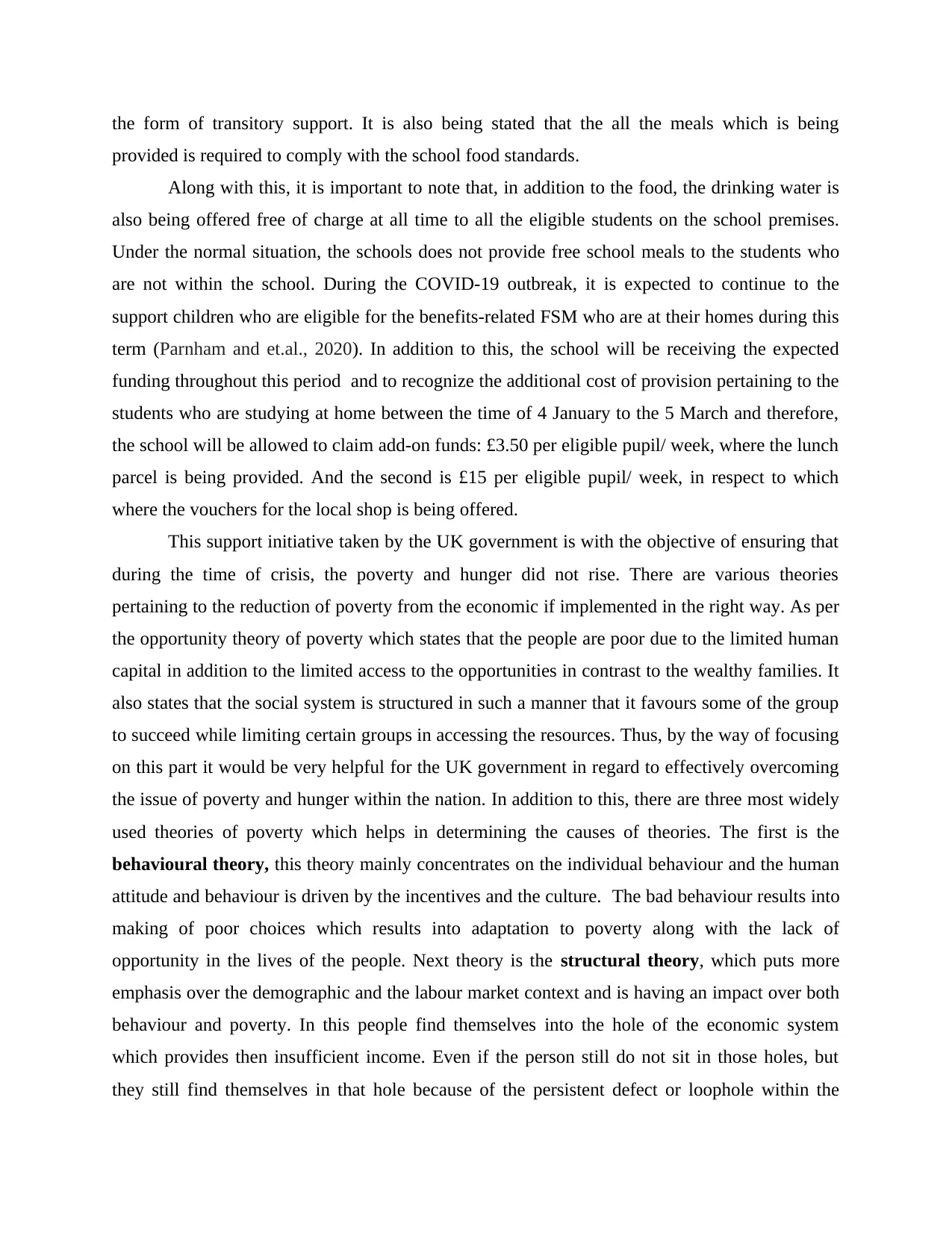
the form of transitory support. It is also being stated that the all the meals which is being
provided is required to comply with the school food standards.
Along with this, it is important to note that, in addition to the food, the drinking water is
also being offered free of charge at all time to all the eligible students on the school premises.
Under the normal situation, the schools does not provide free school meals to the students who
are not within the school. During the COVID-19 outbreak, it is expected to continue to the
support children who are eligible for the benefits-related FSM who are at their homes during this
term (Parnham and et.al., 2020). In addition to this, the school will be receiving the expected
funding throughout this period and to recognize the additional cost of provision pertaining to the
students who are studying at home between the time of 4 January to the 5 March and therefore,
the school will be allowed to claim add-on funds: £3.50 per eligible pupil/ week, where the lunch
parcel is being provided. And the second is £15 per eligible pupil/ week, in respect to which
where the vouchers for the local shop is being offered.
This support initiative taken by the UK government is with the objective of ensuring that
during the time of crisis, the poverty and hunger did not rise. There are various theories
pertaining to the reduction of poverty from the economic if implemented in the right way. As per
the opportunity theory of poverty which states that the people are poor due to the limited human
capital in addition to the limited access to the opportunities in contrast to the wealthy families. It
also states that the social system is structured in such a manner that it favours some of the group
to succeed while limiting certain groups in accessing the resources. Thus, by the way of focusing
on this part it would be very helpful for the UK government in regard to effectively overcoming
the issue of poverty and hunger within the nation. In addition to this, there are three most widely
used theories of poverty which helps in determining the causes of theories. The first is the
behavioural theory, this theory mainly concentrates on the individual behaviour and the human
attitude and behaviour is driven by the incentives and the culture. The bad behaviour results into
making of poor choices which results into adaptation to poverty along with the lack of
opportunity in the lives of the people. Next theory is the structural theory, which puts more
emphasis over the demographic and the labour market context and is having an impact over both
behaviour and poverty. In this people find themselves into the hole of the economic system
which provides then insufficient income. Even if the person still do not sit in those holes, but
they still find themselves in that hole because of the persistent defect or loophole within the
provided is required to comply with the school food standards.
Along with this, it is important to note that, in addition to the food, the drinking water is
also being offered free of charge at all time to all the eligible students on the school premises.
Under the normal situation, the schools does not provide free school meals to the students who
are not within the school. During the COVID-19 outbreak, it is expected to continue to the
support children who are eligible for the benefits-related FSM who are at their homes during this
term (Parnham and et.al., 2020). In addition to this, the school will be receiving the expected
funding throughout this period and to recognize the additional cost of provision pertaining to the
students who are studying at home between the time of 4 January to the 5 March and therefore,
the school will be allowed to claim add-on funds: £3.50 per eligible pupil/ week, where the lunch
parcel is being provided. And the second is £15 per eligible pupil/ week, in respect to which
where the vouchers for the local shop is being offered.
This support initiative taken by the UK government is with the objective of ensuring that
during the time of crisis, the poverty and hunger did not rise. There are various theories
pertaining to the reduction of poverty from the economic if implemented in the right way. As per
the opportunity theory of poverty which states that the people are poor due to the limited human
capital in addition to the limited access to the opportunities in contrast to the wealthy families. It
also states that the social system is structured in such a manner that it favours some of the group
to succeed while limiting certain groups in accessing the resources. Thus, by the way of focusing
on this part it would be very helpful for the UK government in regard to effectively overcoming
the issue of poverty and hunger within the nation. In addition to this, there are three most widely
used theories of poverty which helps in determining the causes of theories. The first is the
behavioural theory, this theory mainly concentrates on the individual behaviour and the human
attitude and behaviour is driven by the incentives and the culture. The bad behaviour results into
making of poor choices which results into adaptation to poverty along with the lack of
opportunity in the lives of the people. Next theory is the structural theory, which puts more
emphasis over the demographic and the labour market context and is having an impact over both
behaviour and poverty. In this people find themselves into the hole of the economic system
which provides then insufficient income. Even if the person still do not sit in those holes, but
they still find themselves in that hole because of the persistent defect or loophole within the
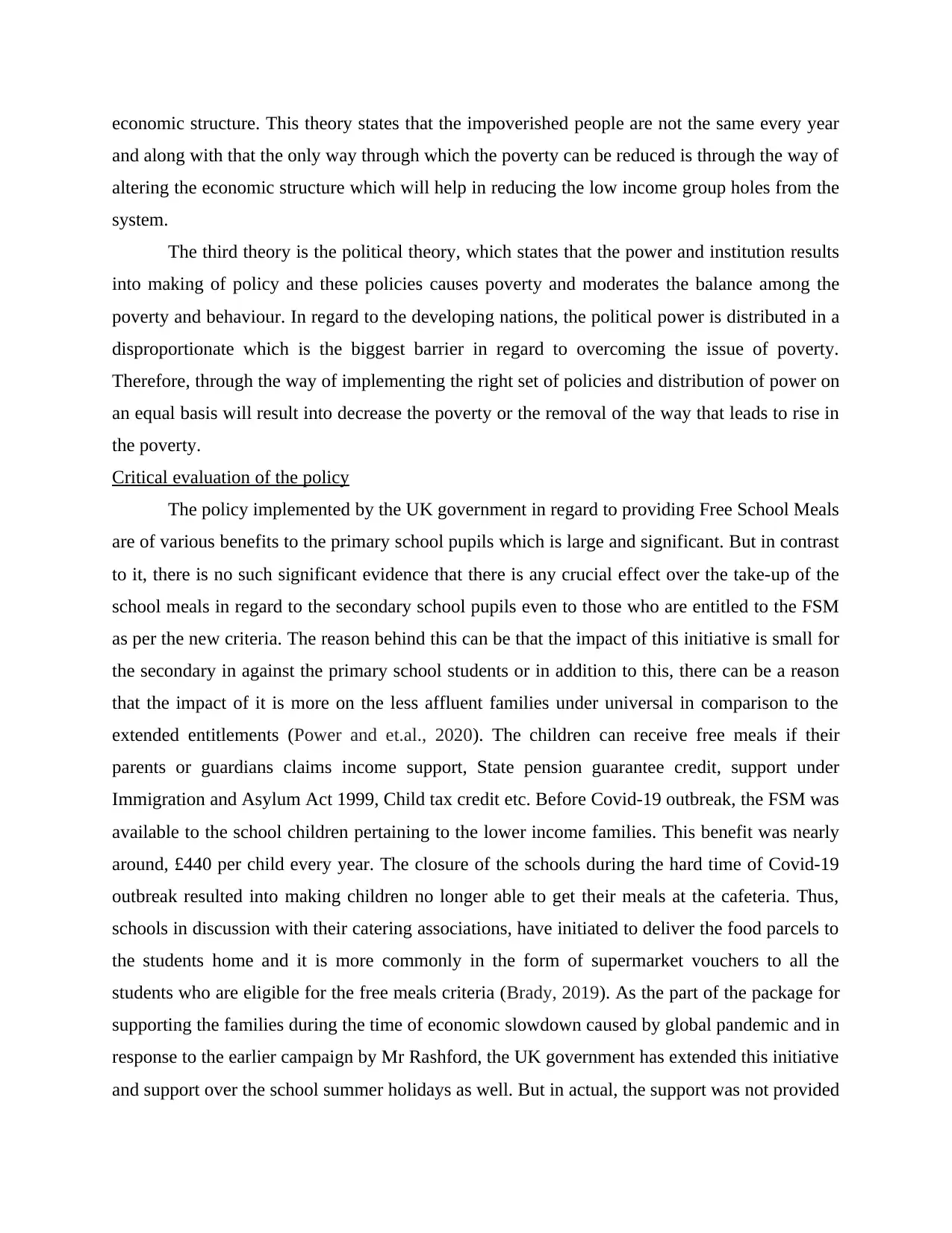
economic structure. This theory states that the impoverished people are not the same every year
and along with that the only way through which the poverty can be reduced is through the way of
altering the economic structure which will help in reducing the low income group holes from the
system.
The third theory is the political theory, which states that the power and institution results
into making of policy and these policies causes poverty and moderates the balance among the
poverty and behaviour. In regard to the developing nations, the political power is distributed in a
disproportionate which is the biggest barrier in regard to overcoming the issue of poverty.
Therefore, through the way of implementing the right set of policies and distribution of power on
an equal basis will result into decrease the poverty or the removal of the way that leads to rise in
the poverty.
Critical evaluation of the policy
The policy implemented by the UK government in regard to providing Free School Meals
are of various benefits to the primary school pupils which is large and significant. But in contrast
to it, there is no such significant evidence that there is any crucial effect over the take-up of the
school meals in regard to the secondary school pupils even to those who are entitled to the FSM
as per the new criteria. The reason behind this can be that the impact of this initiative is small for
the secondary in against the primary school students or in addition to this, there can be a reason
that the impact of it is more on the less affluent families under universal in comparison to the
extended entitlements (Power and et.al., 2020). The children can receive free meals if their
parents or guardians claims income support, State pension guarantee credit, support under
Immigration and Asylum Act 1999, Child tax credit etc. Before Covid-19 outbreak, the FSM was
available to the school children pertaining to the lower income families. This benefit was nearly
around, £440 per child every year. The closure of the schools during the hard time of Covid-19
outbreak resulted into making children no longer able to get their meals at the cafeteria. Thus,
schools in discussion with their catering associations, have initiated to deliver the food parcels to
the students home and it is more commonly in the form of supermarket vouchers to all the
students who are eligible for the free meals criteria (Brady, 2019). As the part of the package for
supporting the families during the time of economic slowdown caused by global pandemic and in
response to the earlier campaign by Mr Rashford, the UK government has extended this initiative
and support over the school summer holidays as well. But in actual, the support was not provided
and along with that the only way through which the poverty can be reduced is through the way of
altering the economic structure which will help in reducing the low income group holes from the
system.
The third theory is the political theory, which states that the power and institution results
into making of policy and these policies causes poverty and moderates the balance among the
poverty and behaviour. In regard to the developing nations, the political power is distributed in a
disproportionate which is the biggest barrier in regard to overcoming the issue of poverty.
Therefore, through the way of implementing the right set of policies and distribution of power on
an equal basis will result into decrease the poverty or the removal of the way that leads to rise in
the poverty.
Critical evaluation of the policy
The policy implemented by the UK government in regard to providing Free School Meals
are of various benefits to the primary school pupils which is large and significant. But in contrast
to it, there is no such significant evidence that there is any crucial effect over the take-up of the
school meals in regard to the secondary school pupils even to those who are entitled to the FSM
as per the new criteria. The reason behind this can be that the impact of this initiative is small for
the secondary in against the primary school students or in addition to this, there can be a reason
that the impact of it is more on the less affluent families under universal in comparison to the
extended entitlements (Power and et.al., 2020). The children can receive free meals if their
parents or guardians claims income support, State pension guarantee credit, support under
Immigration and Asylum Act 1999, Child tax credit etc. Before Covid-19 outbreak, the FSM was
available to the school children pertaining to the lower income families. This benefit was nearly
around, £440 per child every year. The closure of the schools during the hard time of Covid-19
outbreak resulted into making children no longer able to get their meals at the cafeteria. Thus,
schools in discussion with their catering associations, have initiated to deliver the food parcels to
the students home and it is more commonly in the form of supermarket vouchers to all the
students who are eligible for the free meals criteria (Brady, 2019). As the part of the package for
supporting the families during the time of economic slowdown caused by global pandemic and in
response to the earlier campaign by Mr Rashford, the UK government has extended this initiative
and support over the school summer holidays as well. But in actual, the support was not provided
⊘ This is a preview!⊘
Do you want full access?
Subscribe today to unlock all pages.

Trusted by 1+ million students worldwide
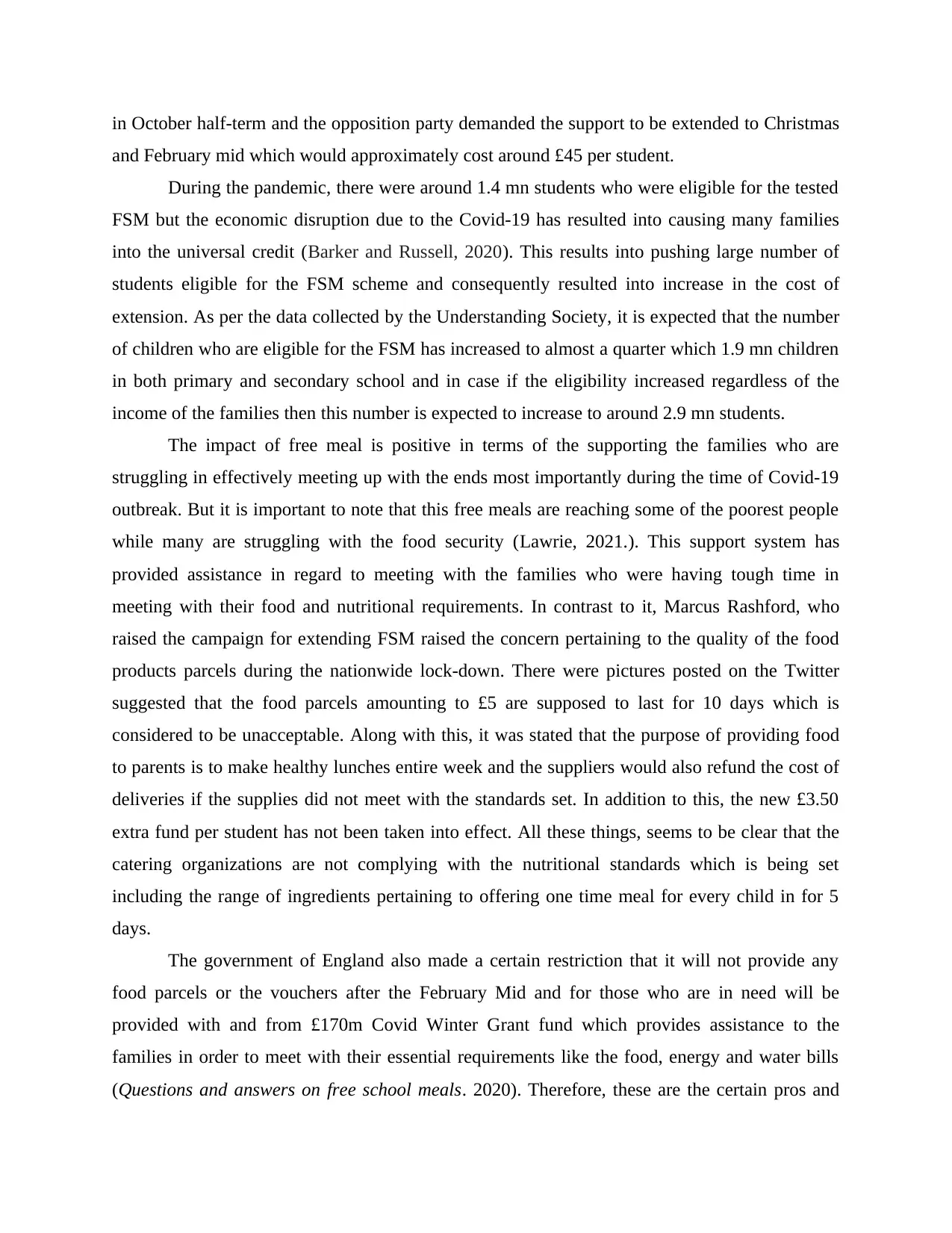
in October half-term and the opposition party demanded the support to be extended to Christmas
and February mid which would approximately cost around £45 per student.
During the pandemic, there were around 1.4 mn students who were eligible for the tested
FSM but the economic disruption due to the Covid-19 has resulted into causing many families
into the universal credit (Barker and Russell, 2020). This results into pushing large number of
students eligible for the FSM scheme and consequently resulted into increase in the cost of
extension. As per the data collected by the Understanding Society, it is expected that the number
of children who are eligible for the FSM has increased to almost a quarter which 1.9 mn children
in both primary and secondary school and in case if the eligibility increased regardless of the
income of the families then this number is expected to increase to around 2.9 mn students.
The impact of free meal is positive in terms of the supporting the families who are
struggling in effectively meeting up with the ends most importantly during the time of Covid-19
outbreak. But it is important to note that this free meals are reaching some of the poorest people
while many are struggling with the food security (Lawrie, 2021.). This support system has
provided assistance in regard to meeting with the families who were having tough time in
meeting with their food and nutritional requirements. In contrast to it, Marcus Rashford, who
raised the campaign for extending FSM raised the concern pertaining to the quality of the food
products parcels during the nationwide lock-down. There were pictures posted on the Twitter
suggested that the food parcels amounting to £5 are supposed to last for 10 days which is
considered to be unacceptable. Along with this, it was stated that the purpose of providing food
to parents is to make healthy lunches entire week and the suppliers would also refund the cost of
deliveries if the supplies did not meet with the standards set. In addition to this, the new £3.50
extra fund per student has not been taken into effect. All these things, seems to be clear that the
catering organizations are not complying with the nutritional standards which is being set
including the range of ingredients pertaining to offering one time meal for every child in for 5
days.
The government of England also made a certain restriction that it will not provide any
food parcels or the vouchers after the February Mid and for those who are in need will be
provided with and from £170m Covid Winter Grant fund which provides assistance to the
families in order to meet with their essential requirements like the food, energy and water bills
(Questions and answers on free school meals. 2020). Therefore, these are the certain pros and
and February mid which would approximately cost around £45 per student.
During the pandemic, there were around 1.4 mn students who were eligible for the tested
FSM but the economic disruption due to the Covid-19 has resulted into causing many families
into the universal credit (Barker and Russell, 2020). This results into pushing large number of
students eligible for the FSM scheme and consequently resulted into increase in the cost of
extension. As per the data collected by the Understanding Society, it is expected that the number
of children who are eligible for the FSM has increased to almost a quarter which 1.9 mn children
in both primary and secondary school and in case if the eligibility increased regardless of the
income of the families then this number is expected to increase to around 2.9 mn students.
The impact of free meal is positive in terms of the supporting the families who are
struggling in effectively meeting up with the ends most importantly during the time of Covid-19
outbreak. But it is important to note that this free meals are reaching some of the poorest people
while many are struggling with the food security (Lawrie, 2021.). This support system has
provided assistance in regard to meeting with the families who were having tough time in
meeting with their food and nutritional requirements. In contrast to it, Marcus Rashford, who
raised the campaign for extending FSM raised the concern pertaining to the quality of the food
products parcels during the nationwide lock-down. There were pictures posted on the Twitter
suggested that the food parcels amounting to £5 are supposed to last for 10 days which is
considered to be unacceptable. Along with this, it was stated that the purpose of providing food
to parents is to make healthy lunches entire week and the suppliers would also refund the cost of
deliveries if the supplies did not meet with the standards set. In addition to this, the new £3.50
extra fund per student has not been taken into effect. All these things, seems to be clear that the
catering organizations are not complying with the nutritional standards which is being set
including the range of ingredients pertaining to offering one time meal for every child in for 5
days.
The government of England also made a certain restriction that it will not provide any
food parcels or the vouchers after the February Mid and for those who are in need will be
provided with and from £170m Covid Winter Grant fund which provides assistance to the
families in order to meet with their essential requirements like the food, energy and water bills
(Questions and answers on free school meals. 2020). Therefore, these are the certain pros and
Paraphrase This Document
Need a fresh take? Get an instant paraphrase of this document with our AI Paraphraser
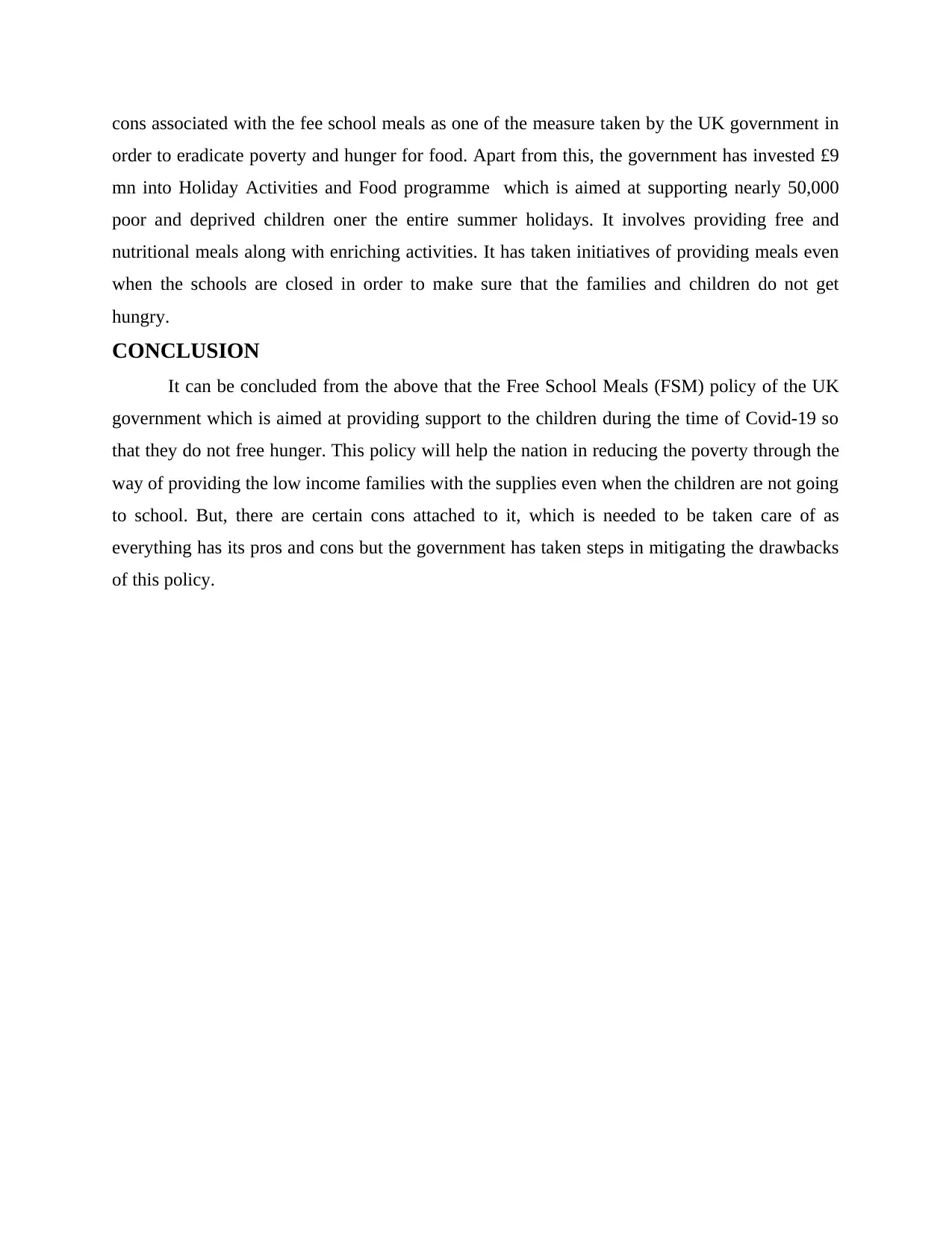
cons associated with the fee school meals as one of the measure taken by the UK government in
order to eradicate poverty and hunger for food. Apart from this, the government has invested £9
mn into Holiday Activities and Food programme which is aimed at supporting nearly 50,000
poor and deprived children oner the entire summer holidays. It involves providing free and
nutritional meals along with enriching activities. It has taken initiatives of providing meals even
when the schools are closed in order to make sure that the families and children do not get
hungry.
CONCLUSION
It can be concluded from the above that the Free School Meals (FSM) policy of the UK
government which is aimed at providing support to the children during the time of Covid-19 so
that they do not free hunger. This policy will help the nation in reducing the poverty through the
way of providing the low income families with the supplies even when the children are not going
to school. But, there are certain cons attached to it, which is needed to be taken care of as
everything has its pros and cons but the government has taken steps in mitigating the drawbacks
of this policy.
order to eradicate poverty and hunger for food. Apart from this, the government has invested £9
mn into Holiday Activities and Food programme which is aimed at supporting nearly 50,000
poor and deprived children oner the entire summer holidays. It involves providing free and
nutritional meals along with enriching activities. It has taken initiatives of providing meals even
when the schools are closed in order to make sure that the families and children do not get
hungry.
CONCLUSION
It can be concluded from the above that the Free School Meals (FSM) policy of the UK
government which is aimed at providing support to the children during the time of Covid-19 so
that they do not free hunger. This policy will help the nation in reducing the poverty through the
way of providing the low income families with the supplies even when the children are not going
to school. But, there are certain cons attached to it, which is needed to be taken care of as
everything has its pros and cons but the government has taken steps in mitigating the drawbacks
of this policy.
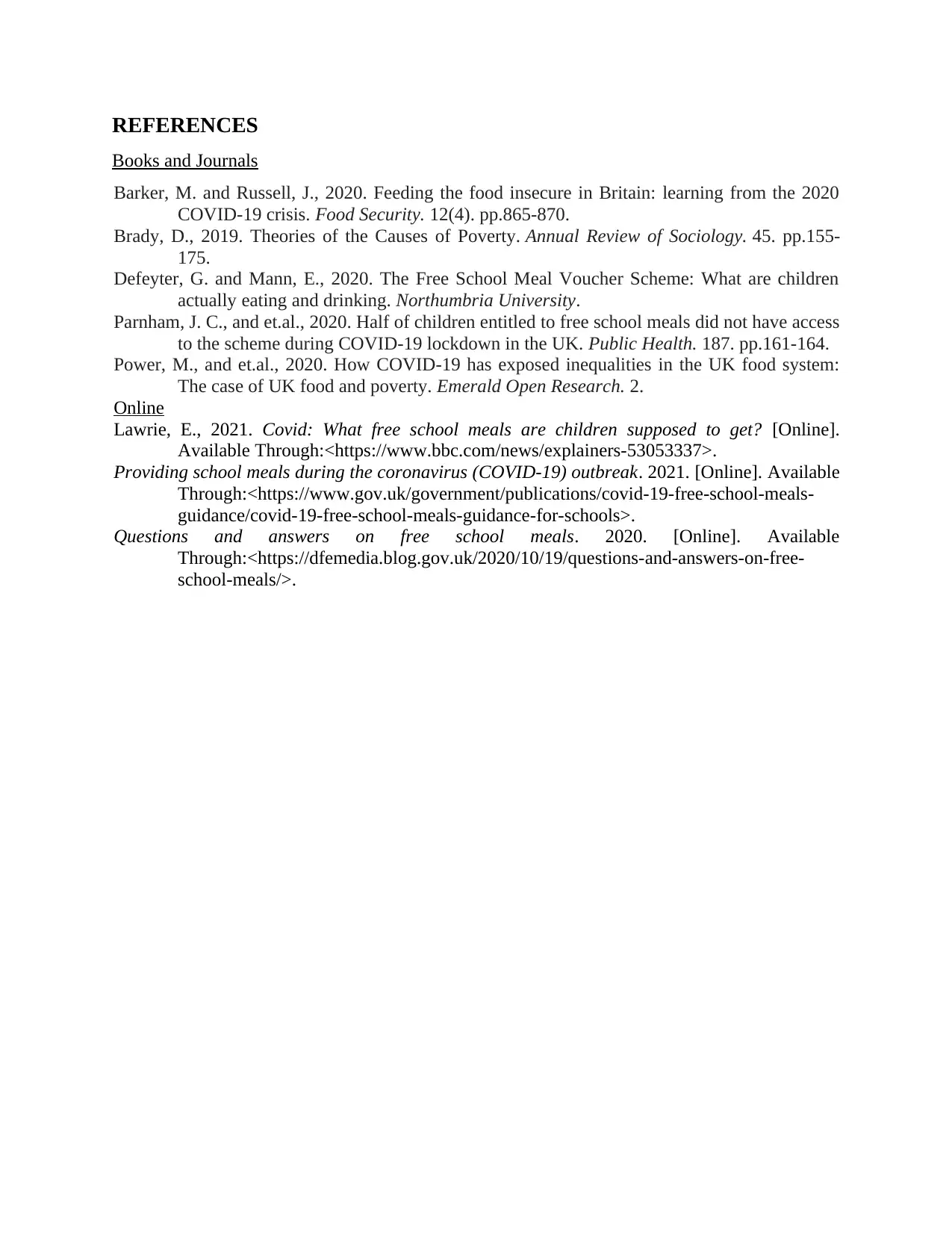
REFERENCES
Books and Journals
Barker, M. and Russell, J., 2020. Feeding the food insecure in Britain: learning from the 2020
COVID-19 crisis. Food Security. 12(4). pp.865-870.
Brady, D., 2019. Theories of the Causes of Poverty. Annual Review of Sociology. 45. pp.155-
175.
Defeyter, G. and Mann, E., 2020. The Free School Meal Voucher Scheme: What are children
actually eating and drinking. Northumbria University.
Parnham, J. C., and et.al., 2020. Half of children entitled to free school meals did not have access
to the scheme during COVID-19 lockdown in the UK. Public Health. 187. pp.161-164.
Power, M., and et.al., 2020. How COVID-19 has exposed inequalities in the UK food system:
The case of UK food and poverty. Emerald Open Research. 2.
Online
Lawrie, E., 2021. Covid: What free school meals are children supposed to get? [Online].
Available Through:<https://www.bbc.com/news/explainers-53053337>.
Providing school meals during the coronavirus (COVID-19) outbreak. 2021. [Online]. Available
Through:<https://www.gov.uk/government/publications/covid-19-free-school-meals-
guidance/covid-19-free-school-meals-guidance-for-schools>.
Questions and answers on free school meals. 2020. [Online]. Available
Through:<https://dfemedia.blog.gov.uk/2020/10/19/questions-and-answers-on-free-
school-meals/>.
Books and Journals
Barker, M. and Russell, J., 2020. Feeding the food insecure in Britain: learning from the 2020
COVID-19 crisis. Food Security. 12(4). pp.865-870.
Brady, D., 2019. Theories of the Causes of Poverty. Annual Review of Sociology. 45. pp.155-
175.
Defeyter, G. and Mann, E., 2020. The Free School Meal Voucher Scheme: What are children
actually eating and drinking. Northumbria University.
Parnham, J. C., and et.al., 2020. Half of children entitled to free school meals did not have access
to the scheme during COVID-19 lockdown in the UK. Public Health. 187. pp.161-164.
Power, M., and et.al., 2020. How COVID-19 has exposed inequalities in the UK food system:
The case of UK food and poverty. Emerald Open Research. 2.
Online
Lawrie, E., 2021. Covid: What free school meals are children supposed to get? [Online].
Available Through:<https://www.bbc.com/news/explainers-53053337>.
Providing school meals during the coronavirus (COVID-19) outbreak. 2021. [Online]. Available
Through:<https://www.gov.uk/government/publications/covid-19-free-school-meals-
guidance/covid-19-free-school-meals-guidance-for-schools>.
Questions and answers on free school meals. 2020. [Online]. Available
Through:<https://dfemedia.blog.gov.uk/2020/10/19/questions-and-answers-on-free-
school-meals/>.
⊘ This is a preview!⊘
Do you want full access?
Subscribe today to unlock all pages.

Trusted by 1+ million students worldwide
1 out of 9
Your All-in-One AI-Powered Toolkit for Academic Success.
+13062052269
info@desklib.com
Available 24*7 on WhatsApp / Email
![[object Object]](/_next/static/media/star-bottom.7253800d.svg)
Unlock your academic potential
Copyright © 2020–2025 A2Z Services. All Rights Reserved. Developed and managed by ZUCOL.